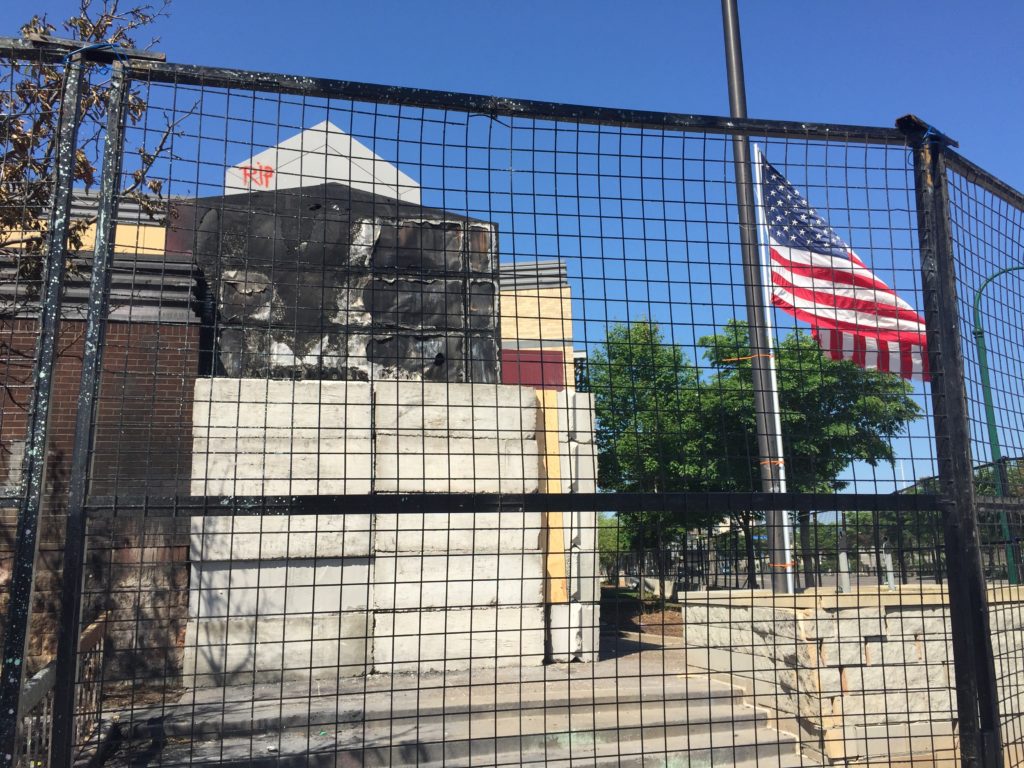Was it really only two weeks ago that Emily, Gwyn, and I sat on the capitol mall chanting, “No justice, no peace!” from behind our Covid masks, the smell of smoke still hanging in our cities, the national guard an intimidating phalanx of militarism circling the building, with the perpetual chop of helicopters overhead? Today is summer at its most glorious—sun spangling leaves, a hot blue sky. To see people streaming around the city lakes, you’d think Minneapolis has returned to normal (as though life in a pandemic killing thousands, especially the poor and people of color, is normal). All you need is a drive down burnt and boarded up Lake Street to dismantle that illusion.
I’ve been pondering our chant which has become what Al Sharpton calls the “rallying cry” of Black Americans whenever a “grave miscarriage of justice” befalls the disenfranchised. When we shouted it to that white-domed seat of government defended by armed and armored guardsmen (and they were all men), the statement “No justice, no peace” was conditional; we were saying to those in power, “We’re going to disrupt the peace until everyone on our streets is treated humanely, and until the discriminatory, violent police force is held accountable.” When the due process of law and the customary machinations of democracy don’t lead to equitable change, people use the only power they can—disrupting peace with protest—to leverage change. And when peaceful protest repeatedly fails, what other recourse do the disenfranchised have but to wreck havoc?
While I would never condone the destruction that laid waste to what was a vibrant swath of my neighborhood, I certainly understand it. What does it take to be heard? What will it take to see change? (The white supremacists and anarchists, however, who leapt into a volatile situation with a lit match, who raced through my neighborhood in trucks with lights off and license plates removed, and who I believe are responsible for far more arson than has been reported—these I hold accountable as terrorists engaged in racially charged urban warfare on a spectrum of continuity with the violent lawlessness of our police. These are the people I fear.)
In fact, the phrase, “No justice, no peace” is a metaphysical statement, an irreducible truth that describes how the world functions, with no exceptions. If a society is unjust, it is never peaceful. Justice and peace are inextricable, critical components of one another. The reason we don’t know this is because we assume we are separate from one another rather than intricately interdependent; I assume that, if my life is peaceful, surely others’ lives should be peaceful too, and if I experience justice, surely everyone must. Those who know the privilege of a dominant race, culture, economic status, gender, or sexual orientation find it easy to be complacent, to blame the victim. In one of my favorite passages from “Letter from a Birmingham Jail,” Dr. Martin Luther King, Jr. wrote, “Injustice anywhere is a threat to justice everywhere. We are caught in an inescapable network of mutuality, tied in a single garment of destiny. Whatever affects one directly, affects all indirectly.”
This is the truth the Black Lives Matters movement chants in hopes that people of privilege will wake up. When I yell “No justice, no peace” to the powers that be, I also shout it to myself. Open your eyes; know this single, spectacularly colorful and mutually dependent garment of which you are a part! –Elizabeth Jarrett Andrew
